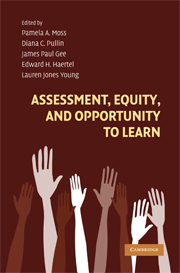Book contents
- Frontmatter
- Contents
- Preface
- List of Contributors
- ASSESSMENT, EQUITY, AND OPPORTUNITY TO LEARN
- 1 Introduction
- 2 Assessment Through the Lens of “Opportunity to Learn”
- 3 A Sociological Perspective on Opportunity to Learn and Assessment
- 4 A Sociocultural Perspective on Opportunity to Learn
- 5 Individualizing Assessment and Opportunity to Learn
- 6 Cultural Modeling as Opportunity to Learn
- 7 Opportunities to Learn in Practice and Identity
- 8 Game-Like Learning
- 9 Sociocultural Implications for Assessment I
- 10 Issues of Structure and Issues of Scale in Assessment from a Situative/Sociocultural Perspective
- 11 Sociocultural Implications for Assessment II
- 12 Assessment, Equity, and Opportunity to Learn
- Index
- References
8 - Game-Like Learning
An Example of Situated Learning and Implications for Opportunity to Learn
Published online by Cambridge University Press: 05 June 2012
- Frontmatter
- Contents
- Preface
- List of Contributors
- ASSESSMENT, EQUITY, AND OPPORTUNITY TO LEARN
- 1 Introduction
- 2 Assessment Through the Lens of “Opportunity to Learn”
- 3 A Sociological Perspective on Opportunity to Learn and Assessment
- 4 A Sociocultural Perspective on Opportunity to Learn
- 5 Individualizing Assessment and Opportunity to Learn
- 6 Cultural Modeling as Opportunity to Learn
- 7 Opportunities to Learn in Practice and Identity
- 8 Game-Like Learning
- 9 Sociocultural Implications for Assessment I
- 10 Issues of Structure and Issues of Scale in Assessment from a Situative/Sociocultural Perspective
- 11 Sociocultural Implications for Assessment II
- 12 Assessment, Equity, and Opportunity to Learn
- Index
- References
Summary
KNOWLEDGE: AS NOUN AND VERB
The theory of learning in many schools today is based on what I would call the “content fetish” (Gee 2004). The content fetish is the view that any academic area (whether physics, sociology, or history) is composed of a set of facts or a body of information and that the way learning should work is through teaching and testing such facts and information.
However, for some current learning theorists, “know” is a verb before it is a noun, “knowledge” (Barsalou 1999a, 1999b; Bereiter and Scardamalia 1993; Clark 1997; Glenberg 1997; Glenberg and Robertson 1999; Lave and Wenger 1991; Rogoff 1990). Any actual domain of knowledge, academic or not, is first and foremost a set of activities (special ways of acting and interacting so as to produce and use knowledge) and experiences (special ways of seeing, valuing, and being in the world). Physicists do physics. They talk physics. And when they are being physicists, they see and value the world in a different way than do non-physicists. The same applies for good anthropologists, linguists, urban planners, army officers, doctors, artists, literary critics, historians, and so on (diSessa 2000; Lave 1996; Ochs, Gonzales, and Jacoby 1996; Shaffer 2004).
Yet if much decontextualized, overt information and skill-and-drill on facts does not work as a theory of learning, neither does “anything goes,” “just turn learners loose in rich environments,” “no need for teachers” (Kirschner, Sweller, and Clark 2006).
- Type
- Chapter
- Information
- Assessment, Equity, and Opportunity to Learn , pp. 200 - 221Publisher: Cambridge University PressPrint publication year: 2008
References
- 27
- Cited by



